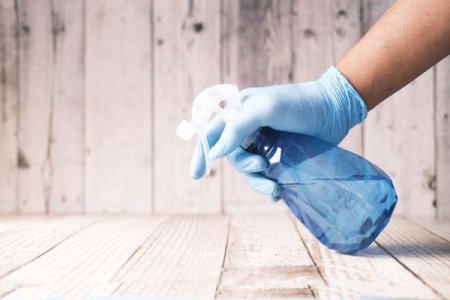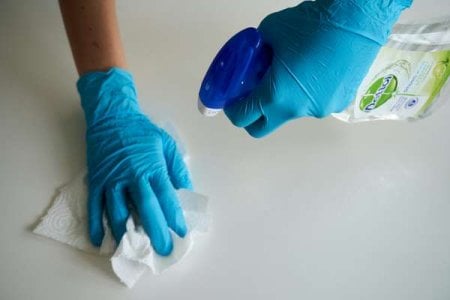Cleaning with Vinegar: Simple Tips for a Sparkling Home
Are you a fan of finding smart ways to save money on household expenses while also being environmentally friendly? Well, here at the Seniors Discount Club, we are thrilled to share some fantastic, budget-friendly tips that revolve around a humble pantry staple—white vinegar.
Chances are, you've probably come across this age-old cleaning solution during chats with your loved ones. The best part? A 2-litre bottle of white vinegar will only set you back around $1.70 at the supermarket, making it incredibly affordable.
Not only that, but it's also non-toxic and highly versatile, giving you an up-to-date cleaning tip that's both easy on the wallet and eco-conscious.

To remind you of the numerous benefits of this unassuming ingredient, we've put together a useful list of tips on how and where you can incorporate it into your laundry, kitchen, and bathroom cleaning routines.
But before you dive in, just remember to check if your cleaning surfaces can handle vinegar to avoid any potential damage. Now, let's kick-start your vinegar-powered cleaning!
Pour a cup of vinegar into a bowl on the bottom rack of the empty dishwasher before running it on a hot cycle to remove limescale and grease. Simple, right?
Experts reassure that vinegar is antimicrobial and entirely safe for food. Just remember to replace your kitchen sponge regularly, particularly if it has a persistent smell or appears discoloured.
Wet the window surface using a sponge and then squeegee it off for impressive results. Don't do it on a sunny day, or you might end up with streaks!

Grab a spray bottle and mix two parts vinegar with one part water. If you'd like to mask the vinegar's smell, you can add a few drops of essential oils.
Optionally, you can also add a bit of dishwashing detergent for some extra cleaning power. This mixture works wonders for wiping your sinks and benchtops!
However, be cautious; chef knives are usually sensitive to vinegar, so don't leave the vinegar-soaked paper towels on for too long.
For your shower heads, submerge them in a vinegar-filled plastic bag to dissolve mineral deposits and improve water flow.
 Armed with these vinegar-based cleaning tips, we hope you'll transform your home into a sparkling and hygienic haven.
Armed with these vinegar-based cleaning tips, we hope you'll transform your home into a sparkling and hygienic haven.
But if you're hungry for more cleaning wisdom, we've got you covered. You can find an abundance of additional tips and tricks right here.
We're also curious, do you have other cleaning tips you can share with us? We're all ears! Feel free to enlighten us with your tips and tricks.
Chances are, you've probably come across this age-old cleaning solution during chats with your loved ones. The best part? A 2-litre bottle of white vinegar will only set you back around $1.70 at the supermarket, making it incredibly affordable.
Not only that, but it's also non-toxic and highly versatile, giving you an up-to-date cleaning tip that's both easy on the wallet and eco-conscious.

White vinegar is a versatile cleaning agent known for its natural disinfecting and deodorising properties. Image by towfiqu999999 from unsplash
To remind you of the numerous benefits of this unassuming ingredient, we've put together a useful list of tips on how and where you can incorporate it into your laundry, kitchen, and bathroom cleaning routines.
But before you dive in, just remember to check if your cleaning surfaces can handle vinegar to avoid any potential damage. Now, let's kick-start your vinegar-powered cleaning!
Washing Machines and Dishwashers
White vinegar doesn't only help eliminate soap scum, bad odours, and mould from your washing machines, but it's equally effective in maintaining your dishwasher's performance and keeping your dishes squeaky clean.Pour a cup of vinegar into a bowl on the bottom rack of the empty dishwasher before running it on a hot cycle to remove limescale and grease. Simple, right?
Disinfecting Kitchen Sponges
Given that kitchen sponges are notorious for being breeding grounds for germs, it's highly advisable to keep them as germ-free as possible. You can quickly achieve this by soaking the sponges in vinegar overnight.Experts reassure that vinegar is antimicrobial and entirely safe for food. Just remember to replace your kitchen sponge regularly, particularly if it has a persistent smell or appears discoloured.
Window Cleaning
Who doesn't love sparkling windows? Mix equal parts vinegar and hot water (add a dash of dishwashing detergent for extra power) to create an effective window-cleaning solution.Wet the window surface using a sponge and then squeegee it off for impressive results. Don't do it on a sunny day, or you might end up with streaks!
Sinks and Benchtops

It can effectively remove stains, tackle grease, and leave surfaces clean and refreshed without the need for harsh chemicals. Image by uniqueton from unsplash
Grab a spray bottle and mix two parts vinegar with one part water. If you'd like to mask the vinegar's smell, you can add a few drops of essential oils.
Optionally, you can also add a bit of dishwashing detergent for some extra cleaning power. This mixture works wonders for wiping your sinks and benchtops!
Cutting Boards
Chopping boards are often overlooked when it comes to cleaning. To disinfect them, either spray them with the vinegar-water mixture and let it sit for five minutes or apply full-strength vinegar and let it sit for a while. Finish off by handwashing or throwing it in the dishwasher.Knife Blocks
Although it's not a frequent task, every now and then, you might want to freshen the slots of your knife blocks to keep them hygienic. Soak paper towels in vinegar, wrap them around your knives, and carefully insert them back into the slots.However, be cautious; chef knives are usually sensitive to vinegar, so don't leave the vinegar-soaked paper towels on for too long.
Floors
Ditch those highly-priced floor cleaners and mix one cup of vinegar with four litres of warm water to disinfect and shine your floors. Rest assured that the vinegar smell fades quickly. Please note that vinegar is not suitable for vinyl, linoleum or hardwood floors.Shower Glass and Shower Heads
To tackle soap scum and hard water stains, mix equal parts vinegar and water in a spray bottle. Apply it to your shower glass, scrub it with a scourer, and leave it on for 10 to 15 minutes before rinsing it off.For your shower heads, submerge them in a vinegar-filled plastic bag to dissolve mineral deposits and improve water flow.
Fabric Softener Alternative
Pour half a cup of white vinegar into your washing machine's fabric softener compartment to effectively soften clothes, especially towels, without leaving a lingering vinegar smell.Descaling Kettles
To descale kettles, mix equal parts water and vinegar, bring it to a boil, and let it sit for 15 minutes before rinsing. Repeat the process or give the kettle interior a gentle scrub if needed.Mould and Mildew Removal
To remove mould and mildew on various surfaces, including blinds and window areas, use undiluted vinegar. Spray it on the affected area, let it sit for a while, and then scrub and rinse off with water.
Key Takeaways
- White vinegar is a budget-friendly, low-tox, and versatile cleaning product that can be used throughout the home.
- It can clean washing machines, dishwashers, kitchen sponges, windows, benchtops, chopping boards, knife blocks, floors, shower glass, and shower heads, and as a fabric softener alternative.
- In many cases, vinegar can be mixed with water or other ingredients to make effective cleaning solutions.
- However, there are a few surfaces and materials that you should not use vinegar on to avoid causing damage.
But if you're hungry for more cleaning wisdom, we've got you covered. You can find an abundance of additional tips and tricks right here.
We're also curious, do you have other cleaning tips you can share with us? We're all ears! Feel free to enlighten us with your tips and tricks.








